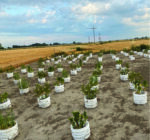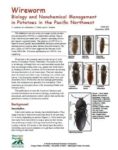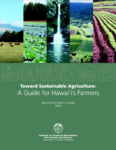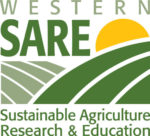The educational materials listed on this page are about Biological Control.
What is biological pest control? Biological pest control mitigates agricultural pest damage by introducing or enhancing the population of pathogens, parasites or predators which prey upon the targeted pest. Biological control is often used in tandem with other pest management strategies, including physical control, cultural control and chemical controls.
There are three types of biological pest control. Classical biological control is the importation and release of natural beneficial insects for the biological control of exotic pests. Augmentation refers to the addition to the population of a natural enemy in a field where it is not currently present, or present only in small number. Producers who conserve the populations of augmented natural enemies or the ones that are already present in and around their fields are using conservation biological control. Biological pest control examples include the release of parasitic wasps to control corn borer, and lady beetles to control aphids in a wide range of crops. Biological pest control methods also include the integration of flowering crops and cover crops, vegetated buffer zones and crop rotations to provide beneficial enemies with adequate habitat.
The advantages of using biological pest control include the capacity to establish a sustainable population of predators that target a specific pest, avoiding the need for costly non-discriminatory pesticides (including biological pesticides) which can negatively impact the crop and/or beneficial organisms such as pollinators. The disadvantages of biological pest control include the risk of unpredictable and detrimental impacts on non-target species, which can reduce biodiversity in the agroecosystem.
SARE's Manage Insects on Your Farm describes the role biological control plays in ecological pest management. A Whole Farm Approach to Managing Pests provides insights on how to rethink farming systems from the ground up to incorporate pest management into the entire production system. Cover Cropping for Pollinators and Beneficial Insects outlines how to select and manage cover crops to attract beneficial insects.
Showing 1-6 of 6 results

Idaho Student Researchers Work to Eradicate Pale Cyst Nematode
When the pale cyst nematode, Globodera pallida, was discovered in southeastern Idaho in 2006, potato exports in Idaho and the United States were severely impacted. The nematode, which can devastate a potato crop, is a quarantine pest regulated by U.S. Department of Agriculture’s Animal and Plant Health Inspection Service. The Idaho infestation is found within […]

Wireworm Biology and Nonchemical Management in Potatoes
This bulletin is one of a series on organic potato production developed by OSPUD, a collaboration among Oregon State University personnel and 11 farmers operating diversified organic vegetable farms. The purpose of OSPUD is to improve potato quality and profitability through a participatory learning process and on-farm, farmer-directed research. The first two years of OSPUD […]

A Guide for Hawai’i’s Farmers
This guide was developed to assist new farmers in tropical small-island settings by providing a distillation of expert information on sustainable agriculture principles, agroecology, crop production, animal production, agroforestry and marketing.

Earwigs Found to be Beneficial in Apple Orchards
Sustainable Agriculture Fact Sheet April 2020 Crop: Apples Need: Discovering whether earwigs are pest, neutral or beneficial insects in apple orchards States: Washington Background: Woolly apple aphids are a serious pest in apple orchards and are difficult to control with current insecticides. However, beneficial insect predators can […]

Fresh Growth Podcast
Fresh Growth: Approaches to a More Sustainable Future from Western Ag Practitioners introduces you to farmers and ranchers from around the western United States who are finding innovative sustainable practices that enrich the natural resources we all care about. These successful multi-generational operations experiment with new ideas and are making it pay. Listen in as […]

Using Beneficial Insects to Combat Pests and Engage Growers
Sustainable Agriculture Fact Sheet July 2020 State: California Commodity: Wine grapes Need: An economical way to control leafroll virus, which is spread by vine mealybugs Summary: Leafroll virus is infecting California grapevines at an alarming rate due to an aggressive insect vector, the vine mealybug. Leafroll virus infections reduce crop yield and quality, decrease a […]